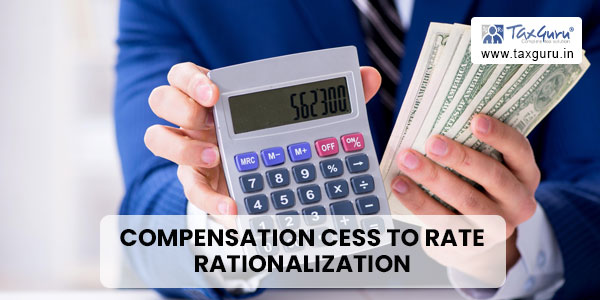In GST, the Government makes laws on the recommendations of the GST council. For that reason, the GST council meets on a regular basis to monitor the requirements of the economy and propose changes in the laws or issue clarifications for better implementation of the laws. On 18th February, the GST council met for the 49th time and proposed various changes. The proposals made in the council meetings are then given effect in the Act and rules through issuance of notifications or circulars.
A press release has been issued to circulate the proposed changes. The major changes/recommendations are given below:
- GST Compensation
- GST Appellate Tribunal
- Approval of Report of GoM on Capacity Based Taxation and Special Composition Scheme in certain sectors on GST
- Recommendations relating to GST rates on Goods and Services
- Other measures for facilitation of trade
1. GST Compensation:
The Government of India has decided to clear the pending balance of GST compensation of Rs. 16,982 crores for June 2022. The Centre has decided to release this amount from its own resources.
2. GST Appellate Tribunal:
The Council has adopted the report of the Group of Ministers on the GST Appellate Tribunal pending certain modifications.
3. Approval of Report of GoM on Capacity Based Taxation and Special Composition Scheme in certain sectors on GST:
The Council has given approval on Capacity based taxation and special composition scheme to improve the revenue collection from the commodities like pan masala, gutka, chewing tobacco stating that the capacity based levy not to be prescribed, compliance and tracking measures to be taken to plus leakages/evasions, export of these commodities is to be allowed against LUT only providing consequential refund if accumulated ITC, compensation cess levied on such commodities to be changes to specific tax based levy from ad valorem based levy.
4. Recommendations relating to GST rates on goods and services:
- Changes in GST rates of certain goods
| S. No. | Description | GST rate from | GST rate to |
| 1 | ‘Rab’ | 18% | 5% – if sold prepackaged and labelled
Nil – if sold otherwise |
| 2 | Pencil Sharpener | 18% | 12% |
- The exemption of conducting entrance examination which was earlier available to educational institutions and Central and State educational boards is now being extended to any authority, board or a body set up by the Central Government or State Government including National Testing Agency for conducting entrance examination for admission to educational institutions.
- Taxable services supplied by Courts and Tribunals such as renting of premises to telecommunication companies for installation of towers, renting of chambers to lawyers, etc will now be taxed under reverse charge mechanism (RCM).

5. Measures for facilitation of trade:
- Time limit for filing of revocation of cancellation of registration has been extended from 30 days to 90 days. Where the registered person fails to apply for such revocation within 90 days, the said period may also be extended by Commissioner or an officer authorized by him in his behalf for a further period not exceeding 180 days.
- One time amnesty may be provided for past cases, where registration has been cancelled on account of non-filing of the returns but application for revocation of cancellation of registration could not be filed within the time specified u/s 30 of the CGST Act, by allowing such persons to file such application for revocation by a specified date.
- Amendment to section 62 of the CGST Act, 2017 has also been made to extend the timelines u/s 62(2) to increase the period for filing of the return for enabling deemed withdrawal of the best judgement assessment order from present 30 days to 60 days which can be extended by another 60 days subject to certain conditions.
- The Council has also recommended to provide amnesty scheme for conditional deemed withdrawal of assessment orders in past cases where the return could not be filed within 30 days of the assessment order but has been filed along with due interest and late fees up to a specified date, irrespective of whether appeal has been filed or not against the assessment order or whether the said appeal has been decided or not.
- The Council has recommended to rationalize the late fee for filing of annual return in Form GSTR-9 for FY 2022-23 onwards:
| S. No. | Aggregate Turnover | Late Fee | Late Fees subjected to |
| 1. | Up to Rs. 5 crores | Rs. 50 per day
(Rs. 25 CGST + Rs. 25 SGST) |
0.04% of the turnover in the State
(0.02% CGST + 0.02% SGST) |
| 2. | More than Rs. 5 crores but up to Rs. 20 crores | Rs. 100 per day
(Rs. 50 CGST + Rs. 50 SGST) |
0.04% of the turnover in the State
(0.02% CGST + 0.02% SGST) |
| 3. | More than Rs. 20 crores (No Change) | Rs. 200 per day
(Rs. 100 CGST + Rs. 100 SGST) |
0.5% of the turnover in the State
(0.25% CGST + 0.25% SGST) |
- Amnesty scheme has also been recommended in respect of pending returns in Form GSTR-4, GSTR-9 and GSTR-10 to provide relief to large number of taxpayers by way of conditional waiver/reduction of late fee.
- The Council has recommended to rationalize the provision of place of supply for services of transportation of goods by deletion of section 13(9) of IGST Act, 2017 to provide that the place of supply of services of transportation of goods in case where location of supplier of services or location of recipient of service is outside India, shall be the location of the recipient of services.





